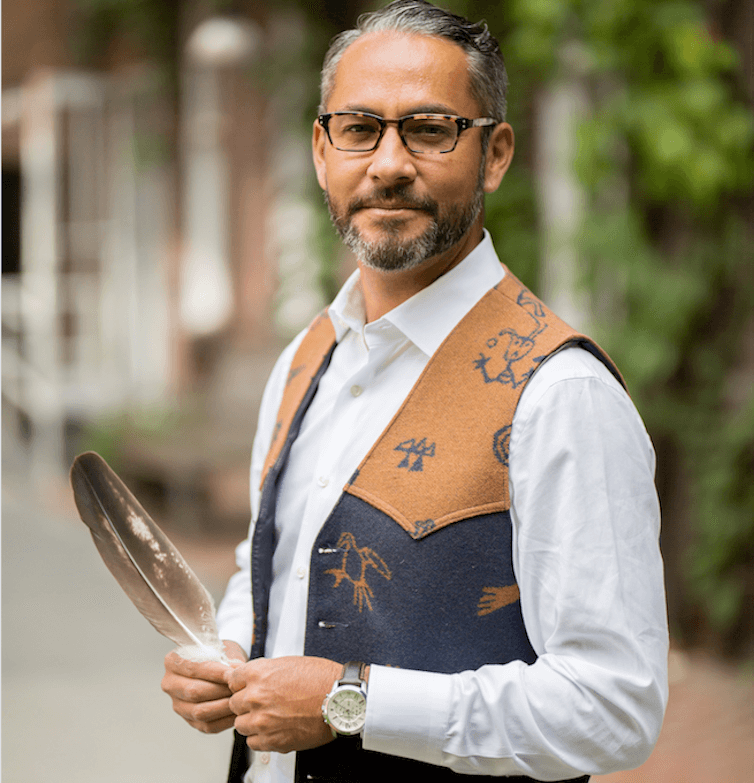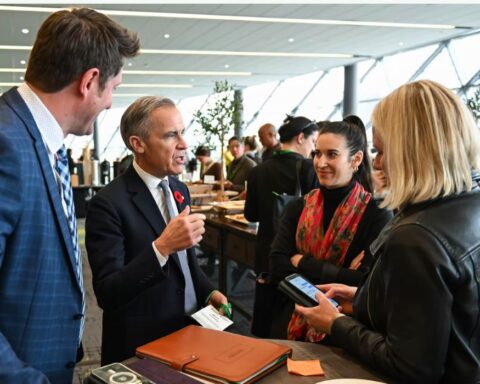As the CEO of the Toronto-based Canadian Council for Aboriginal Business, JP (Jean Paul) Gladu can often be spotted at conferences and functions in a sharply tailored suit with a fashionable flash of lavender or plum peeking out his breast pocket. But Gladu is quick to tell audiences that he’s as comfortable in boardrooms as he is in his bush clothes hunting moose on his First Nation on the shores of Lake Nipigon, near Thunder Bay, Ontario.
Growing up Anishinaabe hunting and fishing with his father, a second-generation logger and chief, Gladu had always planned on becoming a conservation officer. His first job out of forestry school involved working with over 40 First Nations communities across Ontario through the federal First Nations Forestry program, and that, says Gladu, “is when I fell in love with my community.”
“It seemed to me there was real opportunity to build economies, build communities, build jobs, build families. It’s just something that’s always been innate for me.”
Gladu spent the next two decades in the natural resource sector, creating businesses for First Nations, negotiating agreements with the wind, mining and forestry sector, and consulting on everything from sawmill development to biofuels and wind power monitoring sites. One executive MBA from Queen’s University later, Gladu was a natural fit to take over the Canadian Council for Aboriginal Business (CCAB) as president and CEO six years ago. Building economies, communities and jobs is what this power broker does best – and now he’s mobilizing action on all three fronts at the national level.
CCAB was actually started by Shoppers Drug Mart founder Murray Koffler, along with former prime minister Paul Martin and a number of others over 30 years ago, with the goal of “reintegrating” Indigenous people into the Canadian economy. As Gladu says, “I like to remind Canadians that we were Canada’s first economy – we had an economy even before the newcomers, with trade and commerce.”
Today’s Indigenous economy is estimated to be around $32 billion, with roughly 45,000 Indigenous businesses across virtually every sector. “There’s been extraordinary growth,” says Gladu.
But while Indigenous people make up 5% of Canada’s population, there still hasn’t been much in the way of economic reconciliation. Indigenous businesses only account for 0.3% of Canadian federal procurement contracts, points out Gladu. “That’s $60 to 65 million, which is a pittance.”
His current passion project is CCAB’s new Procurement Champions program, which challenges governments and corporations to do better by connecting with Indigenous businesses from coast, to coast, to coast.
“Our MO these days has been around supply change – the opportunity to supply change [through supply chains].”
Gladu tells Corporate Knights how he and his co-chair and incoming Suncor CEO Mark Little went to the federal government and said, “Listen, Suncor spends 10 times what you do on Indigenous businesses (roughly $700 million last year alone) and look at the economic impact that it’s had.”
They’re encouraging the federal government to commit to a 5% target in five years. That would increase the government spend to about a billion dollars a year on Indigenous businesses. If they get all provincial governments and territories to also target 5% that would contribute over $23 billion to Canada’s Indigenous economies, fuelling hundreds of Certified Aboriginal Businesses from printing, engineering and catering companies to architectural and media firms.
Gladu says one of the biggest challenges he and his colleagues face in government meetings is that a lot of the programs and resources set up to support Indigenous communities have been very reactionary – supplying clean drinking water, decent housing, dealing with sky-high youth suicide rates. “All these really important issues,” notes Gladu. “Then someone like me will come and say, ‘don’t forget about business and supply chain and procurement’ and they say, ‘we don’t have time for that right now, we’ve got these other issues.’”
Switching mindsets and changing the narrative to consider what a “strong economy means for our community” is a struggle sometimes for Gladu. Particularly when, as he points out, too many have a bias – “sometimes unconscious and sometimes conscious” – against Indigenous businesses. “People think that it costs more money to do business with us or we don’t have the capacity when the opposite is in fact real. We did the research.”
Beyond its Aboriginal Procurement Marketplace open to Certified Aboriginal Businesses and Procurement Champions, CCAB also connects Indigenous entrepreneurs to tools, training and financing to scale their businesses, as well as a certification program that confirms corporate performance in Aboriginal relations.
Why is this work so meaningful to Gladu, who also has a 15-year-old daughter?
“Both my grandmothers are residential school survivors. I was very fortunate that both my parents had jobs. The impact that those jobs had on my parents and the impact that had on me pushed me to go beyond high school to college. It’s put me in a place now where I can influence and where I can make a difference for my family, for my community and, quite frankly, for my country as a national Indigenous leader.”
Gladu, who’s also on the board of Ontario Power Generation and was recently appointed chancellor of St. Paul’s University College, Waterloo, adds, “None of this would have been possible without a job or without an education. I want my people to have as many opportunities as they choose and that’s not possible without a strong robust economy.”







